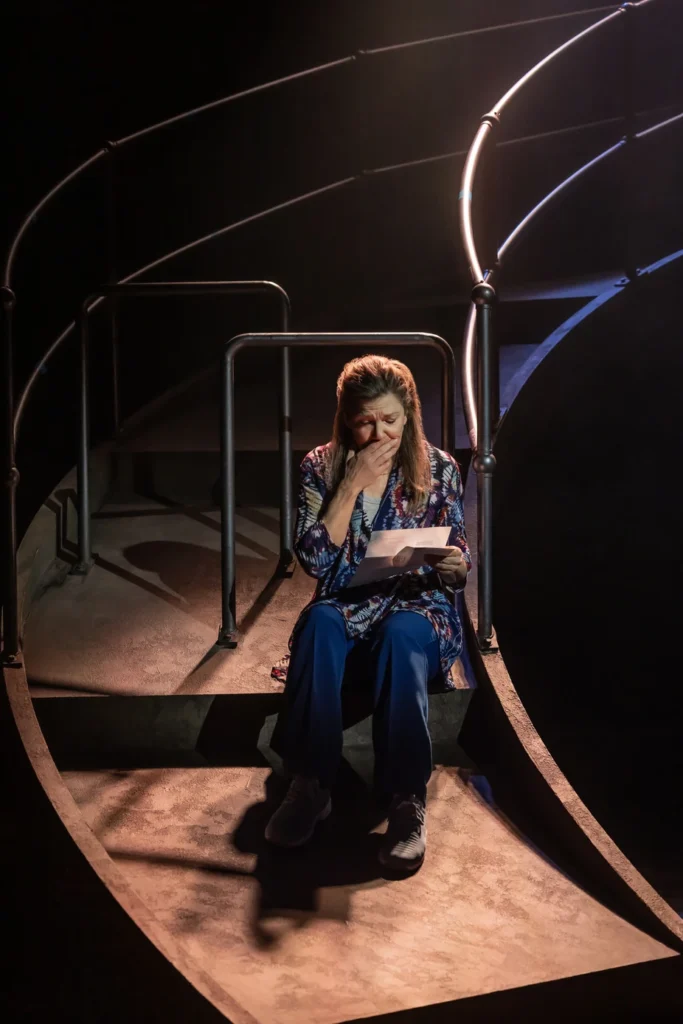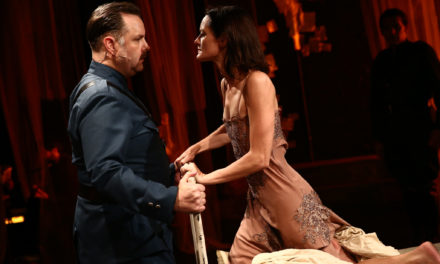James Graham’s play Punch tells the true story of a shiftless, belligerent rowdy who heedlessly kills a guy outside a Nottingham pub one night, with a single unprovoked punch, then after a short prison term miraculously turns his life around and becomes a sort of prodigy of atonement. Based on Jacob Dunne’s much-discussed autobiographical book Right from Wrong (2022), the play explains how, after senselessly wasting the life of a bright and beloved young paramedic named James Hodgkinson, the hell-bent Dunne transforms into a self-aware college grad, loving husband and father, and advocate for a new social program called “Restorative Justice.”
Punch is propulsive, informative, and moving. It’s also basically a public service announcement packaged as drama. Its first and hardest task is to convince us that a guy who committed such a sickening act is worthy of our sympathy. This, astonishingly enough, the play eventually accomplishes. Equally unlikely is that it isn’t mawkishly irritating despite being unabashedly wholesome and tendentious.
Wholesomeness is one of the most reliable markers of dramatic mediocrity, yet Punch is candid, sensitive, and conscious enough of why we might reject it that it rescues itself. What’s more, it arrives at a moment when many of us are feeling emotionally bludgeoned by indiscriminate callousness, so its tale of hard-won connection and forgiveness may just be welcome, even to some hardcore sophisticates.
Act 1 is mostly a social and psychological profile of Jacob, a 19-year-old, low-level drug dealer from a public housing estate who cares only about getting smashed, picking fights, and propping up his bruiser reputation. Will Harrison plays him as a blank-eyed, tightly wound plug of adolescent energy—that fantastic elixir we’re all addicted to despite ourselves. He’s a guy who can’t stop jabbing, pulsing, and darting about, and the director Adam Penford generalizes his hyperactivity as a choral effect, keeping clusters of the cast’s other 9 actors constantly darting around as well, while changing costume pieces to impersonate various people in the story.
There is a cost to the energized kinetic style. Graham, for instance, has Harrison narrate most of the play’s backstory instead of playing it, presumably because narrating is faster than acting flashback scenes. Shortcutting exposition this way is simpler and colder than dialogue. Among the background facts we learn is that Jacob had a caring yet frazzled single-Mum (vividly played by Lucy Taylor), an absentee dad, and an autism diagnosis as a kid. We also witness the awful ordeal of the victim’s parents, David and Joan (Sam Robards and Victoria Clark), as they watch him struggle for life for 9 days before taking him off life-support. After that, they find themselves all but abandoned by social services. Jacob is caught and sentenced to 30 months (of which he ends up serving half), and the state believes justice has been served.
Only in the second act does Punch shift to sustained and thoughtful scenes, and these reflective encounters make the biggest demands on our credulity. What happens—and this has gotten massive media attention so it’s hardly a spoiler—is that David and Joan, unable to move on from their rancor and resentment, seek contact with Jacob through Restorative Justice, if only to learn more about what happened. Jacob agrees, and a bond gradually grows between them.

Sam Robards (David), Vicki Clark (Joan), Camila Cano-Flavia (Nicola), and Will Harison (Jacob). Photo: Matthew Murphy.
How this happens is the enormous question—a major challenge for the actors and audience of this play. Jacob is in danger of being sucked back into his criminal world after release from prison, and his mother dies. At his most vulnerable moment he finds himself touched by a question in Joan’s first letter: “what he’s planning now. What [does] he want, for his life?” That his victim’s mother could ask this, could care about the answer, stuns him and sparks something within. He allows himself to see for the first time that his actions affect other people, and that those people matter. Harrison handles this realization beautifully, letting it sink in with a tearful mix of fear and wonder.
Joan’s saintly trajectory is a little harder to swallow than that, at least for this jaded New Yorker. I can certainly understand her conviction that “one life has been wasted . . . So where’s the sense in wasting another? If we can ‘help’ him?” I also get that such a woman might need to regard a redeemed Jacob as a substitute son, if only to preserve her sanity. I don’t think I’ve ever met anyone quite as Jesus-like as Joan, though. It’s a testament to Victoria Clark’s acting that she convincingly assembles this woman’s uncommon moral impulses, along with her very human hesitations and broken heart, into an affecting flesh-and-blood portrait.
Punch is no masterpiece, but it tells a valuable and necessary story that most of us haven’t heard before and might be surprised to find touching us.
By James Graham
Directed by Adam Penford
Manhattan Theatre Club at The Samuel J. Friedman Theatre
This article appeared in TheatreMatters on October 7, 2025 , and has been reposted with permission. To see the original article click here.
This post was written by the author in their personal capacity.The opinions expressed in this article are the author’s own and do not reflect the view of The Theatre Times, their staff or collaborators.
This post was written by Jonathan Kalb.
The views expressed here belong to the author and do not necessarily reflect our views and opinions.




















